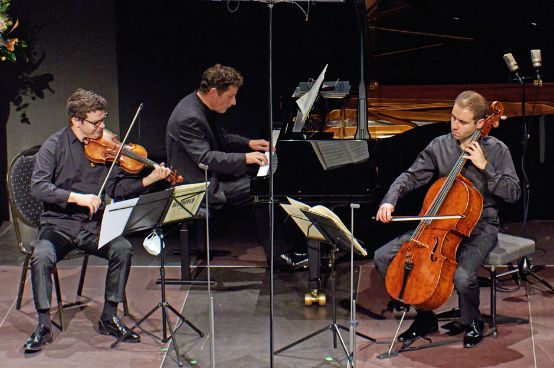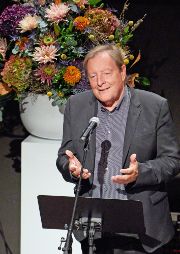Enriching exchange across generations
Orpheum, the foundation for the promotion of young soloists, has been in existence for thirty years. The anniversary was celebrated with chamber music at the Druckerei Baden.

The times are not exactly favorable for lavish celebrations. The Orpheum Foundation, which wanted to celebrate its 30th anniversary at the Tonhalle Maag, also had to learn this. However, the concert hall remained closed due to coronavirus regulations. Nevertheless, the event was held twice on November 7, each time in front of an audience of 50, not in Zurich but at the Baden printing works. The organizer Piano District Baden had made the concert possible and repeated it twice a day later.
The podium was not occupied by an orchestra, as is usually the case at Orpheum, but by the pianist Oliver Schnyder, once also an Orpheum soloist, together with the young violinist David Nebel and the cellist Dorukhan Doruk. They played the Spring Sonata op. 24 and the Cello Sonata op. 102/2 by Beethoven, as well as his Gassenhauertrio - success was certain for the motivated musicians.
Inspiring each other
"It is a not insignificant effort that most concertizing musicians are currently willing to make," commented Oliver Schnyder. "The times demand it, especially the associated commitment to the importance of cultural diversity in a society that is just realizing the upheavals it is facing as a result of the pandemic." It was a chamber music concert with a signal effect.
This intimate setting was one of the most significant moments in the history of the foundation, which was once established with the idea of "giving young musicians the opportunity to perform in front of a large audience accompanied by prominent conductors and orchestras", as Foundation President Hans Heinrich Coninx defined it. This maxim has remained true, but since then "we have opened up new musical formats for our soloists, but also for our audience".
A concert like this with two young and one established musician broadens perspectives for both sides, as Schnyder explained: "The musical exchange between established and aspiring artists is not about teaching the other something, but about being inspired and questioning one's own views. The youngsters live in a different world than I did back then. They see it with different eyes, including music. I learn at least as much from that as they learn from me."
However, a chamber music concert cannot outweigh the magic of performing with an orchestra. Violinist Simone Zgraggen, for example, who was sponsored by the foundation in earlier years, has held a professorship in Freiburg i. Br. since 2012 and is concertmaster of the Basel Sinfonietta, enthuses: "In addition to the concert by Dvořák, which I was able to play in the Tonhalle Zurich, I was also able to perform with the Orpheum soloists Christian Poltéra, David Riniker and Florian Krumpöck in Salzburg, Moscow and again in the Tonhalle, including Beethoven's Triple Concerto."
Important stepping stone
Around 200 young musicians have enjoyed major concerts so far, including names such as Sol Gabetta, Truls Mørk, Alice Sara Ott, Renaud and Gautier Capuçon, Martin Grubinger, Vilde Frang and, more recently, Marc Bouchkov and Christoph Croisé. Fortunately, there are a large number of Swiss players among the participants, not all of whom have made the leap into the elite - that's also part of it.
For many, however, it was an important stepping stone, as cellist Maximilian Hornung says: "Orpheum was an inspiring experience in the truest sense of the word, incredibly motivating and instructive." Coninx offers an interesting addition: "When we realize that many of our soloists were not yet born when Orpheum was founded, then we are on the way to becoming an intergenerational project."
-

Howard Griffiths. Photo: Michael Steiner/Orpheum
Orpheum has adapted and created new formats in order to be able to offer newcomers something special. Artistic Director Howard Griffiths describes the change: "In the beginning, CDs were important and a label looked after an artist for years, which is no longer the case. As a result, they are now often alone with their future, they have to use social media. In return, we have a larger selection of musicians, although the top has still remained pointed. But we always try to select performers with a great musical personality."
Nevertheless, the CD medium will continue to be used with the support of the foundation, for example with the recording of the cello concerto by Paul Wranitzky (1756-1808) with Chiara Enderle. There are already four recordings, and Griffiths says two more are planned for next year with solo concertos by Bernhard Romberg (1767-1841) and Georg Goltermann (1824-1898). They deliberately choose lesser-known works so as not to expose the up-and-coming musicians to comparison with the stars.
Radio SRF 2 recorded the anniversary concert in Baden, and the streaming version is available on the Orpheum website.







